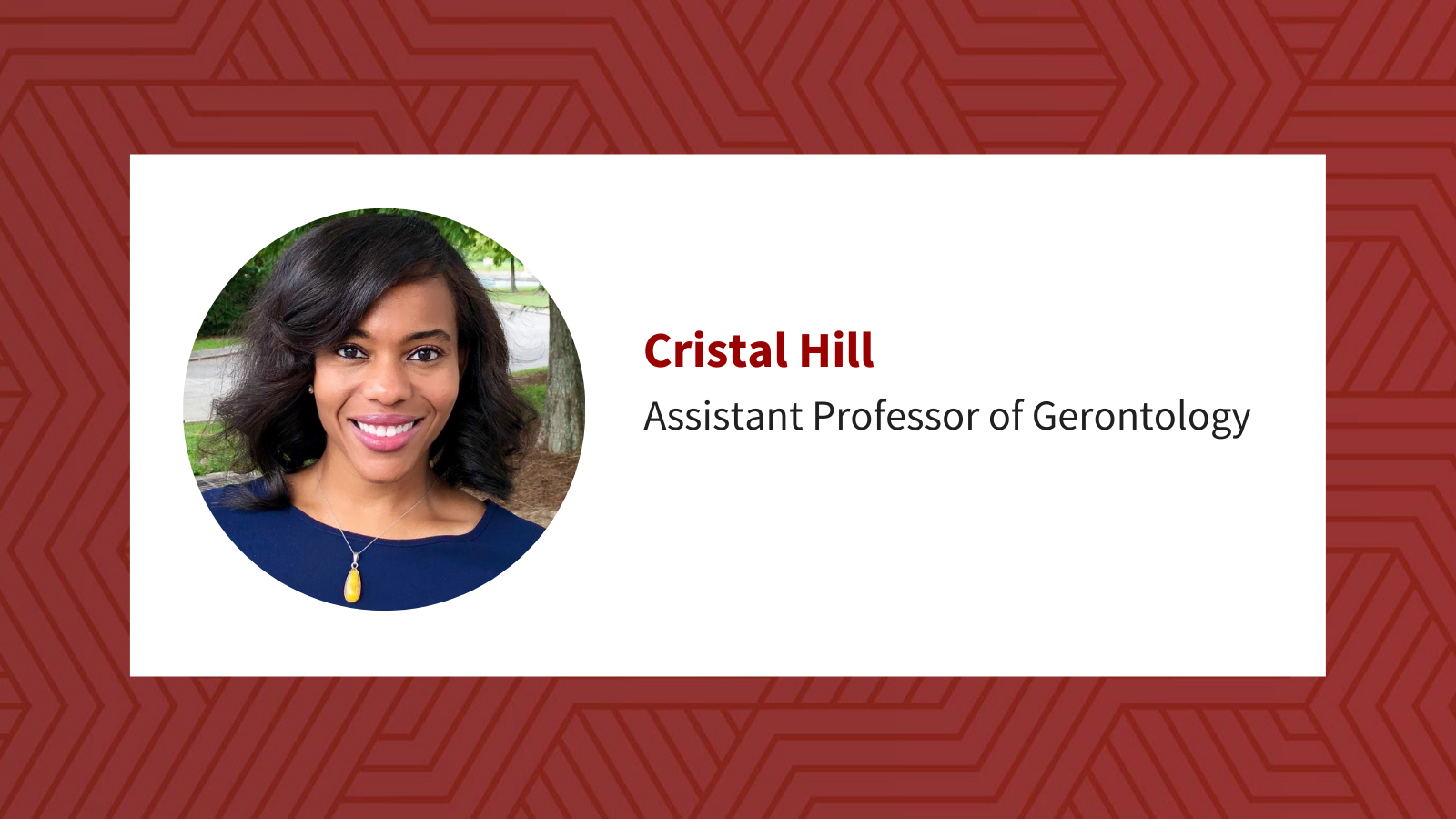Cristal Hill PhD will join the faculty of the USC Leonard Davis School of Gerontology as an assistant professor in January 2023. An expert in bridging research on nutrients and aging, she aims to identify how dietary interventions, particularly low protein diets, can cause molecular changes that prevent disease and promote healthy aging.
“The macronutrients we consume, be they proteins, carbohydrates or fats, induce various signals between our brain and other organs, which in turn uses those signals to regulate cell function, thus impacting health,” said Hill. “Clarifying the genetic and molecular pathways by which this communication occurs can lead to dietary recommendations or other interventions that can improve our health and lifespans.”
The central focus of her lab at USC will be to investigate the distinctive impact of protein restriction on adipose tissue function. Commonly known as body fat, adipose tissue is a critical regulator of energy and glucose homeostasis. However, aging and obesity contribute to various impairments within adipose tissue that are detrimental to optimal health.
“The specific mechanisms within adipose tissue that mediate the effects of low-protein diets on improving metabolic health during aging remains to be identified,” she said. “There is more to consider and discover about how adipose tissue adapts to improve health.”
Her long-term research goal is to further a new framework in aging research that integrates genetics and dietary modification as a basis for translational findings and to train future scientists to conduct research that emphasizes the biology of aging.
“We are thrilled to welcome Cristal Hill and excited about the new directions in aging research that she is advancing,” said Pinchas Cohen, MD, dean of the USC Leonard Davis School. “She is using state-of-the-art technological tools to explore innovative ideas about metabolism in aging, and I am confident she has a great future in our field.”
The recipient of a Maximizing Opportunities for Scientific and Academic Independent Careers (MOSAIC) Postdoctoral Career Transition Award to Promote Diversity—NIH Pathways to Independence (K99/R00) award, Hill’s aging-focused work builds upon research she conducted as a post-doctoral fellow in the lab of Christopher D. Morrison at the Pennington Biomedical Research Center at Louisiana State University. Early work from this lab confirmed that fibroblast growth factor-21 (FGF21) is required to improve metabolic health during protein restriction. FGF21, mostly secreted from the liver, is a beneficial metabolic hormone known to reduce body weight, improve blood sugar regulation, and increase energy expenditure. To expound on FGF21 signaling, during her postdoc training she investigated how the brain responds to FGF21 during protein restriction.
“We showed that FGF21 signaling in the brain is required to improve metabolic health during protein restriction, but we don’t know whether that signaling solely impacts adipose tissue,” said Hill. “My new work will test the hypothesis that the remodeling of adipose tissue in mouse models during dietary protein restriction directly improves metabolic health during aging with the hope that findings can help to address obesity, diabetes or age-related metabolic dysfunction.”
Hill was recognized with the 2021 Young Investigator on Aging Award from the Orentreich Foundation for the Advancement of Science and also received a Ruth L. Kirschstein National Research Service Award (NRSA) Individual Postdoctoral Fellowship (Parent F32) for work focused on the effects neuronal FGF21 signaling effects on metabolism during dietary protein restriction.
In addition to her lab research, Hill is passionate about making science accessible. She previously served as chair of African American initiatives with the American Diabetes Association in Springfield, Illinois, and worked to educate church, senior citizen, and school groups about the high prevalence of diabetes within the underserved populations. She is currently co-chair of the diversity, equity, inclusion, and opportunities committee of the American Aging Association Trainee Chapter and also hopes to inspire more individuals from underrepresented backgrounds to join the field of geroscience.
“Being an African American female scientist, when I started my higher education, I didn’t see many people like me and I’d like to help change that,” she said. “I want to see more young and diverse individuals involved in science, so they can be the next innovator of something that’s going to gain us some insight into how we age. I’ve received so much assistance throughout my academic path and going into my first faculty position. Why would I be selfish with that?”
Hill earned her doctorate in molecular biology, microbiology, and biochemistry at Southern Illinois University School of Medicine. Her training there focused on the mechanisms of biological aging under the mentorship of Andrzej Bartke, a distinguished scholar in aging research. She initially planned to pursue a career as a veterinarian, earning her bachelor’s and master’s degrees in animal sciences from Tuskegee University. Her experience helping to treat diabetic animals in a veterinary clinic, along with her research during her master’s training on high-fat diets and cardiovascular disease in turkeys, steered her toward a career in nutrition and later sparking her interest in biological aging instead.
“I was intrigued that we could use diets to leverage and improve healthy aging, she said. “That potential to effect positive change is what started me on the scientific journey I am on today.”
With her focus on nutrition and longevity, Hill will work alongside other USC Leonard Davis School researchers including Pinchas Cohen, Sean Curran, Valter Longo and Christian Pike, who are assessing ways genes interact with nutrition to affect aging. She says joining the multidisciplinary faculty of the Leonard Davis School feels like the ideal place to pursue her varied scientific interests.
“When I arrived on the campus and met with individuals within in the school, the conversations with the faculty, admins, and students it felt like home,” she said. “It was welcoming, it was warm, it was collaborative. It’s a great place for me to come and continue my research.”





